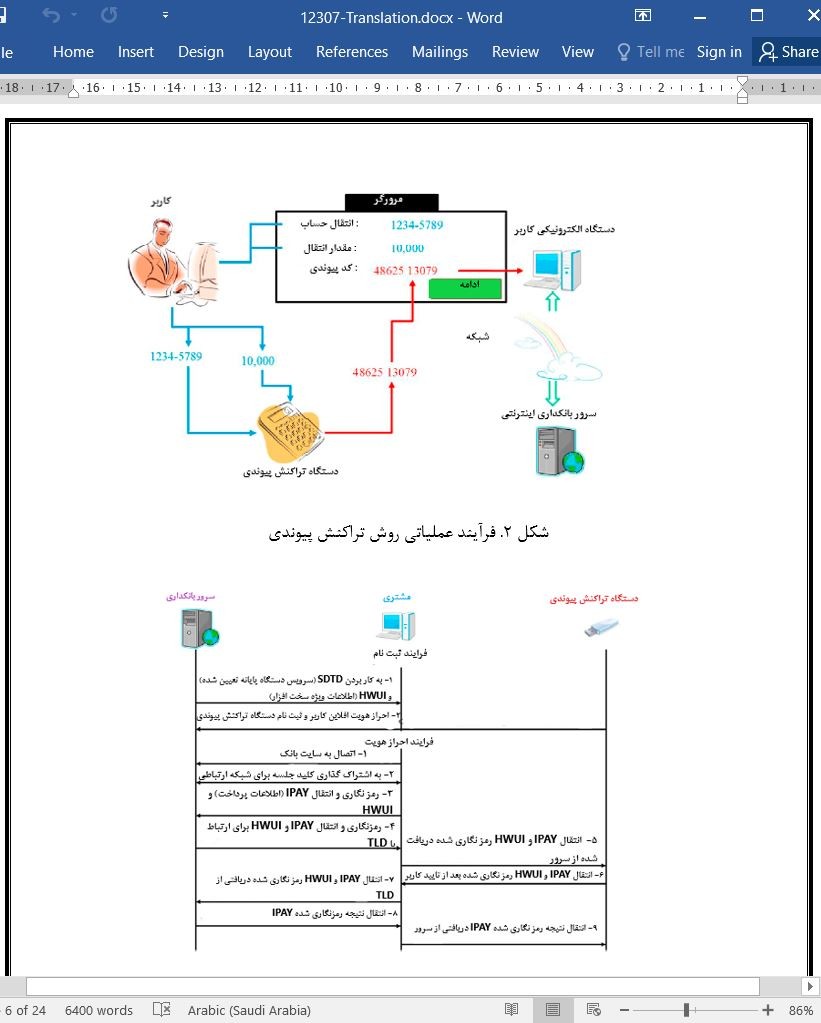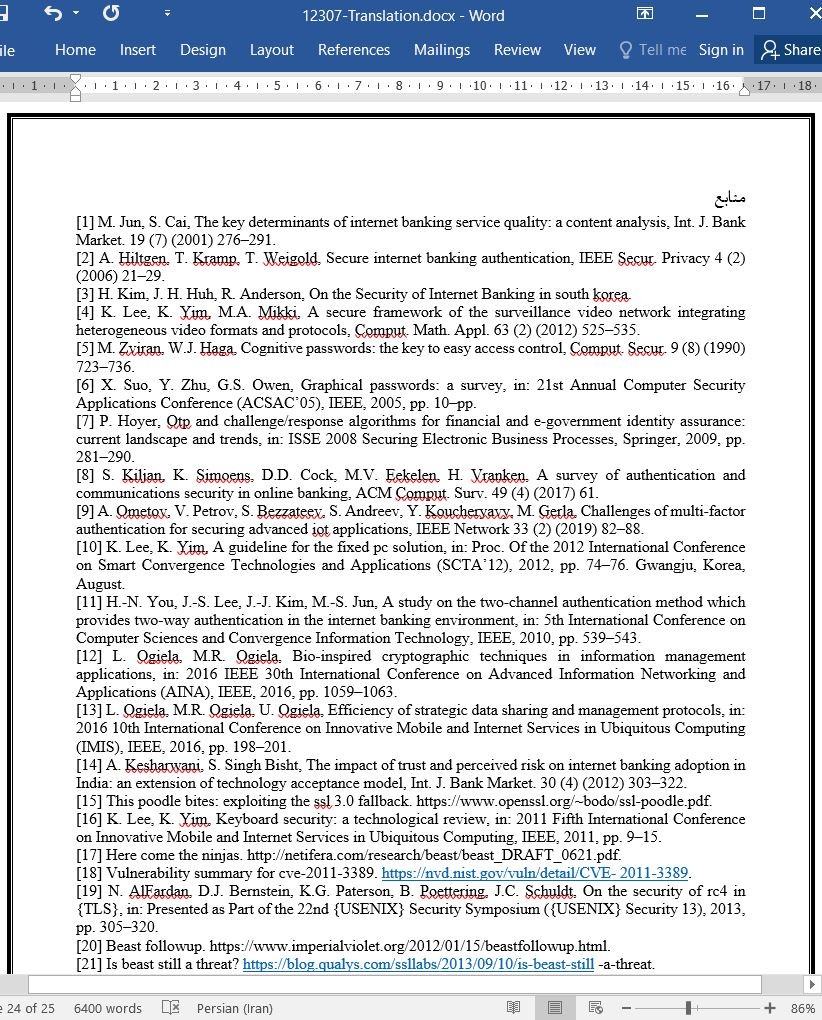
مطالعه بر روی تکنیک تراکنش پیوندی همراه با پایانه تعیین شده برای اینترنت اشیاء مجهز به G5
چکیده
تعداد بازارهای مالی وابسته به اینترنت با افزایش پیشرفت در بانکداری اینترنتی و تجارت الکترونیک، در حال افزایش است. در عین حال، خدمات بانکداری اینترنتی، همواره تحت تاثیر هک کردن بوده اند. به همین دلیل، برای بهبود امنیت فرآیند های شناسایی آنلاین، اقداماتی متقابل نیاز است. فرآیندهای امنیتی و احراز هویت فعلی، امنیت خدمات مالی، مانند خدمات بانکداری اینترنتی برای اینترنت اشیاء دارای 5G، را تضمین نمیکنند. در این مقاله برای حل این مشکل اساسی، یک روش تراکنش پیوندی که با پایانه تعیینشده ترکیب میشود، پیشنهاد شدهاست. با استفاده از این روش، امنیت فرآیندهای شناسایی آنلاین ارتقا می یابد و میتوان با تمام تهدیدهای امنیتی موجود مقابله کرد. روش پیشنهادی از احراز هویت دو طرفه پشتیبانی می کند و از حمله های استراق سمع، باز پخش، کلاه برداری و محرومسازی از سرویس، جلوگیری می کند. علاوه بر این، این روش با ذخیره تاریخچه تراکنش در یک دستگاه تراکنش پیوندی، مانع عدم انکار می شود. ما معتقد هستیم که با استفاده از روش پیشنهادی، امنیت خدمات بانکداری اینترنتی برای اینترنت اشیاء مجهز به 5G، افزایش خواهد یافت.
1. معرفی
مبادله کالاها و خدمات در اینترنت به دلیل افزایش پیشرفت در بانکداری اینترنتی و تجارت الکترونیک، بخش بزرگی از اقتصاد ملی را شامل شده است [1]. علیرغم به کارگیری انواع روش های امنیتی در فرآیندهای ساخت این سیستم ها، خدمات بانکداری اینترنتی کماکان تحت تاثیر هک کردن قرار دارند. علاوه بر این، این نوع خسارت به طور پیوسته رخ می دهد. بنابراین، خدمات مالی آنلاین برای اطمینان از الزامات امنیتی مانند محرمانه بودن، یکپارچگی داده ها، در دسترس بودن و عدم انکار، نیازمند برنامهها و روش های امنیتی عمومی هستند[2]. در چند دهه گذشته، ساز و کارهای مختلف وابسته به رمزنگاری، برای برآوردن این نیازها توسعه یافتهاند، و با استفاده از ابزارهای ریاضی معتبر، اثربخشی آنها اثبات شده است[3]. با این وجود، بیشتر مشکلات امنیتی به جای ظهور در فناوریهای مبتنی بر رمزنگاری، در فرآیند یا محیط بکارگیری روش های امنیتی، رخ می دهند، بنابراین نیازمند تحقیقاتی در مورد آسیب پذیری هایی غیر از فناوری های وابسته به رمزنگاری است و اقداماتی که می تواند از این آسیب پذیری ها جلوگیری کند باید شناسایی شود.
4. نتیجه گیری
یک سرویس رایانه شخصی تعیین شده برای محدود کردن یک پایانه ازاستفاده یک سرویس، زمانی که روش های تایید هویت، بانکداری اینترنتی کنونی را که در معرض تهدیدات امنیتی قرار داشتند، پشتیبانی می کردند، تطبیق یافته است. با اینحال، سرویس رایانه شخصی تعیین شده، در ارزیابی امنیتی قبول نشد و معیارهای ارزیابی را ایجاد نکرد، بنابراین، سرویس همچنان در مقابل تهدیدات امنیتی ایمن نبود. روش تراکنش پیوندی کنونی، برای مقابله با این مشکل، یک کد پیوندی را از ترکیب اطلاعات تراکنش با اطلاعات محرمانه ایجاد کرد. با این وجود، این روش نیز در معرض تهدیدات امنیتی مختلفی قرار گرفت. به این دلایل، تضمینی بابت امنیت توسط سرویس رایانه شخصی تعیین شده و روش تراکنش پیوندی ارائه نمی شود، بنابراین ما برای حل این مشکل، یک روش تراکنش پیوندی را ارایه دادیم که با پایانه تعیین شده ترکیب می شود. روش پیشنهاد شده در این مقاله در مقابل تمام تهدیدات امنیتی ذکر شده، ایمن است و در نتیجه باعث ارتقای روش های تایید هویت آنلاین می شود. ما معتقد هستیم که با استفاده از دستورالعمل پیشنهادی، امنیت خدمات بانکداری اینترنتی به شدت ارتقا خواهد یافت.
Abstract
With the growth of the scale of the market for Internet banking and e-commerce, the number of Internet-based financial markets has been increasing. Meanwhile, hacking incidents continuously affect the Internet-banking services. For this reason, a countermeasure is required to improve the security of the online identification process. The current security and authentication mechanisms applied to financial services, such as Internet banking services for 5G-enabled IoT, do not ensure security. In this paper, a transaction-linkage technique with which the designated terminal is combined is proposed to solve this fundamental problem. The technique improves the security of online identification mechanisms because it is possible to counteract all of the existing security threats. The proposed technique supports mutual authentication and is safe from eavesdropping attacks, replay attacks, spoofing attacks, and service-denial attacks. Moreover, the technique supports non-repudiation by storing the transaction history in a transaction-linkage device. We believe that the security of Internet-banking services for 5G-enabled IoT will be increased through the utilization of the proposed technique.
1. Introduction
With the growth of the scale of the market for Internet banking and ecommerce, the exchange of goods and services on the Internet has become a large part of the national economy [1]. Even though a variety of security techniques are applied in the processes of building these systems, hacking incidents still affect Internet banking services. Moreover, this kind of damage is continuous. Therefore, general security applications and techniques are needed for the online financial service to ensure security requirements such as confidentiality, integrity, availability, and non-repudiation [2]. Various cryptography-based mechanisms have been developed to satisfy these requirements over the past few decades, and their effectiveness was sufficiently proved through the utilization of proven mathematical tools [3]. Nevertheless, most of the security problems emerge in the process or the environment of applying the security techniques rather than in the cryptography-based technologies, so there is a need to research the vulnerabilities beyond the cryptography-based technologies and to identify measures that can counteract these vulnerabilities properly.
4. Conclusions
A designated PC service was adapted to restrict a terminal from using a service when the identity-verification methods supporting the existing Internet-banking services were under security threats. Nevertheless, the designated PC service did not pass the security assessment and did not define the evaluation criteria, so the service was still exposed to security threats. The existing transaction-linkage technique generated a linkage code by combining the transaction information with the secret information to counteract this problem. However, this technique was also exposed to various security threats. For these reasons, the current designated-PC service and transaction-linkage technique do not ensure security, so we proposed a transaction-linkage technique for which the designated terminal is combined to solve those problems. The proposed technique in this paper is capable of counteracting all of the mentioned security threats, thereby improving the online identity verification methods. We believe that the security of the Internet-banking services will be robustly supported by the application of the proposed protocol.
چکیده
1. معرفی
2. معلومات پیشین
3. روش تراکنش پیوندی همراه با پایانه تعیین شده پیشنهادی
3.1. نیازمندی های امنیتی
3.2. فرآیند ثبت نام
3.3. فرآیند احراز هویت
3.4. ارزیابی امنیت
4. نتیجه گیری
منابع
ABSTRACT
1. Introduction
2. Prior knowledge
3. The proposed transaction linkage technique combined with the designated terminal
3.1. Security requirements
3.2. Registration process
3.3. Authentication process
3.4. Security assessment
4. Conclusions
References
- اصل مقاله انگلیسی با فرمت ورد (word) با قابلیت ویرایش
- ترجمه فارسی مقاله با فرمت ورد (word) با قابلیت ویرایش، بدون آرم سایت ای ترجمه
- ترجمه فارسی مقاله با فرمت pdf، بدون آرم سایت ای ترجمه



